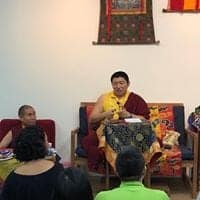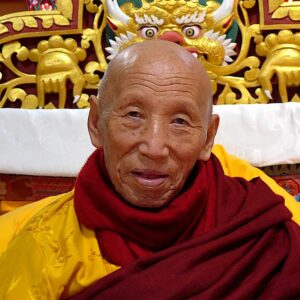Trusting karma is something that many of us struggle with as we begin Dharma practice. But are we clear about what karma really means? Here, Phakchok Rinpoche reminds us that the Sanskrit word karma means “action.” We create karma when we act with our physical body or when we speak. However, it may not be so obvious that we create karma when we think as well. Thoughts produce karma. And our actions may then be either positive (good karma) or negative (bad karma). We can also act neutrally, which produces neutral or indeterminate karma.
Trusting Karma: Why Does it Matter?
Rinpoche explains why it is important for us to develop correct faith or trust in the working of karma. This means that we look at our own current situation or circumstances. We can acknowledge that everything we experience comes about due to causes and conditions. If we consider this, then we can understand that any of our previous good actions contribute to our current pleasant experiences.
In the Buddhist context, this karma accumulates throughout our many lifetimes. And we usually can’t remember our previous actions, can we? Just think about your current life. Do you remember every good or bad action you performed this week? But, if we are in a good situation, it helps to remember that this did not arise because we happen to lucky, without a cause. Our prior good deeds created this state.
Trusting Karma Means Seeing Opportunity for Practice
So, what to do? Rinpoche recommends that we consider how fortunate we are and that we remember that we created this opportunity through virtuous activity. But we don’t just stop there. Instead, we recognize the value and rarity of this state, and we commit to our Dharma practice. When we experience physical or mental discomfort, our minds don’t want to practice, right? We just don’t feel at ease. We’re worried or want to change our pain, right? We tend to complain or to spend our time absorbed in our difficulty. That’s not unusual. Most of us react in this way.
So Rinpoche suggests that when times are good, we remind ourselves that we have the perfect situation to practice. And we might also reflect that situations change without warning. We recall that in the future, we may not have all these conditions. If we approach our situation honestly, then we know that we cannot predict what may come about. But right now, we have the wonderful opportunity to engage in Dharma practice. And we can make aspirations and set our motivation so that whatever happens in the future, we can carry our practice into those difficult situations or times.
Trusting Karma Means Taking Difficulties as Practice
“Believing in karma,” Rinpoche says, “is making your mind ready to approach your practice.” If we trust karma, then we don’t relate to our difficulties as a victim or as an unfair external load we received. Instead, we can take our difficulties into our practice. We realize that we don’t know what negative actions we carried out in our past lives, so we aren’t looking for something to blame. When we believe or trust in karma we don’t just want to be happy all the time. That’s an incorrect understanding. Instead, as genuine practitioners, the Dharma remains our refuge regardless of whether our life is easy or difficult.
Many of us look for solutions when we have difficulties. We turn to mantras and prayers or divination. Or we may visit doctors and experts looking for a “silver bullet,” Rinpoche says. We look for pills or special medicines to reverse the natural process of aging. But what does this indicate? Doesn’t it mean that we don’t really trust in karma, which comes down to action and result?
Trusting Karma Means Remembering Change
 Karma also means that everything changes. Nothing is permanent or lasting. Neither good situations nor bad situations last forever. They all come to an end. So if we’re enjoying pleasant circumstances now, we should repeatedly recall the simple fact that these will not last forever. Because we remember that, we can use the time to practice when things are easy and comfortable. And because we have developed trust in karma, we know that the Dharma is our refuge in good times and in bad.
Karma also means that everything changes. Nothing is permanent or lasting. Neither good situations nor bad situations last forever. They all come to an end. So if we’re enjoying pleasant circumstances now, we should repeatedly recall the simple fact that these will not last forever. Because we remember that, we can use the time to practice when things are easy and comfortable. And because we have developed trust in karma, we know that the Dharma is our refuge in good times and in bad.
How do we know that we have stability in our belief in karma?
Our Job is Not to Explain Others’ Karma
Rinpoche reminds us that karma is extremely difficult to understand. Only the Buddha can see all the effects of karma. For example, we can’t imagine what causes a peacock feather to shine with so many colors, right? We simply don’t see all the causes and conditions that give rise to those variations. Similarly, we can’t know all a person’s previous actions. It is not our job to explain “why” something occurs. There are so many factors we just can’t know or understand. A person who eats all the right foods and watches their weight can still die of the disease. It does happen. Cause and effect definitely work, but we don’t know all the subtle workings. And we certainly don’t know when we will die.
Trusting Karma: How Do We Know Our Belief is Steady?
We can check ourselves to see if we have trust in karma? If we trust completely, then whatever happens — good or bad — does not cause us to look for answers as to “why” it occurred. We don’t lose our faith or confidence in our practice, even when things don’t seem to work. Karma does not mean that everything is completely predetermined. Karma is not set in stone. We can choose to act in certain ways, and if we choose to be virtuous and practice Dharma then it will definitely help.
Trusting Karma in Difficult Situations
If we go through difficulties, we know that we have suffering. But we don’t take the bad situation as a punishment. Instead, we can learn to accept this as our practice. We can work without difficulty by practicing compassion and by confessing all our known and unknown negative actions. If we practice in this way, our bad karma becomes a spur to our practice and becomes part of our path. We can turn the situation into an opportunity to truly find refuge in the Dharma.
Reflection Exercise
Take a look at your own current situation. Do you trust that all your actions (physical, verbal, and mental) produce results? Do you ever spend time worrying and wondering “why” something has happened, or feel like you need to blame an outside factor when things go wrong? During the next several weeks, try to notice if these thoughts occur.
Don’t judge yourself or get upset if they do. Most of us have this conditioning. Instead, can you simply open up to the situation as it is and try to apply compassion for yourself and for all others in that situation or who are suffering? Take time to remind yourself that nothing and no situation is permanent. How does that reminder give you space to practice with the difficulty?
It may help to keep a journal to help you adjust to this way of encountering undesirable situations.










Responses